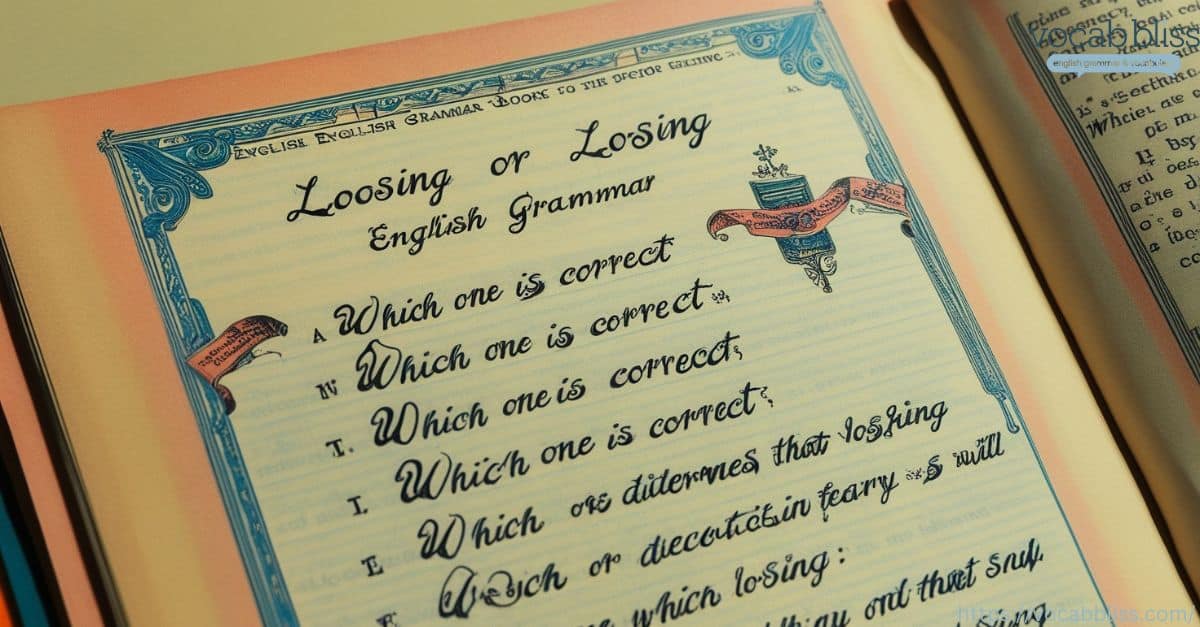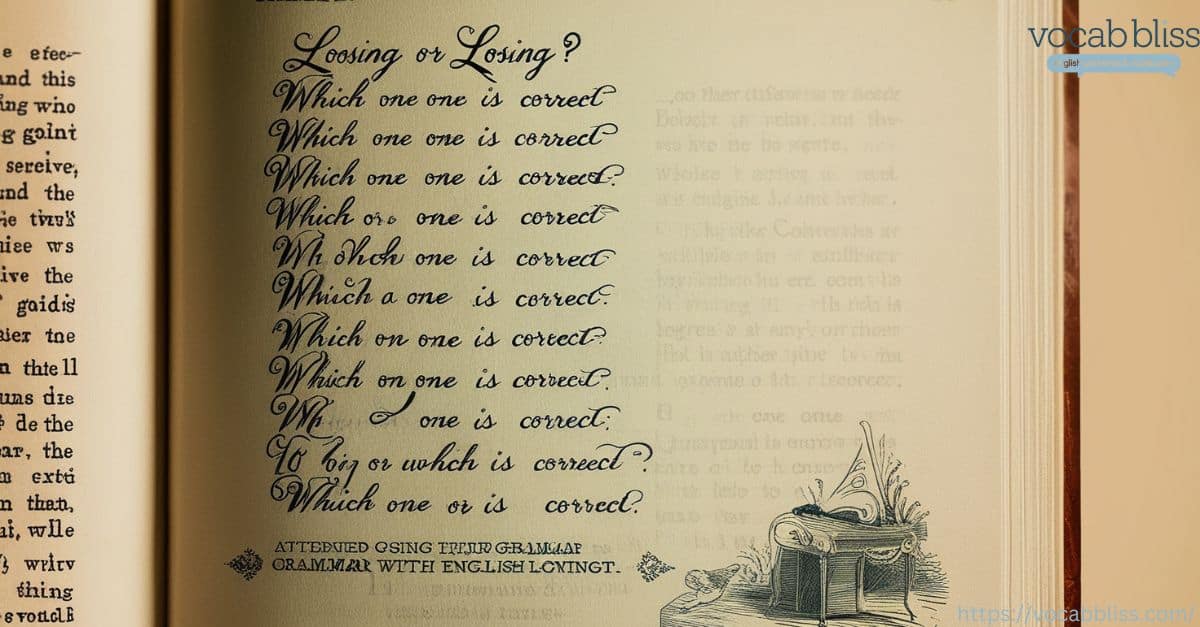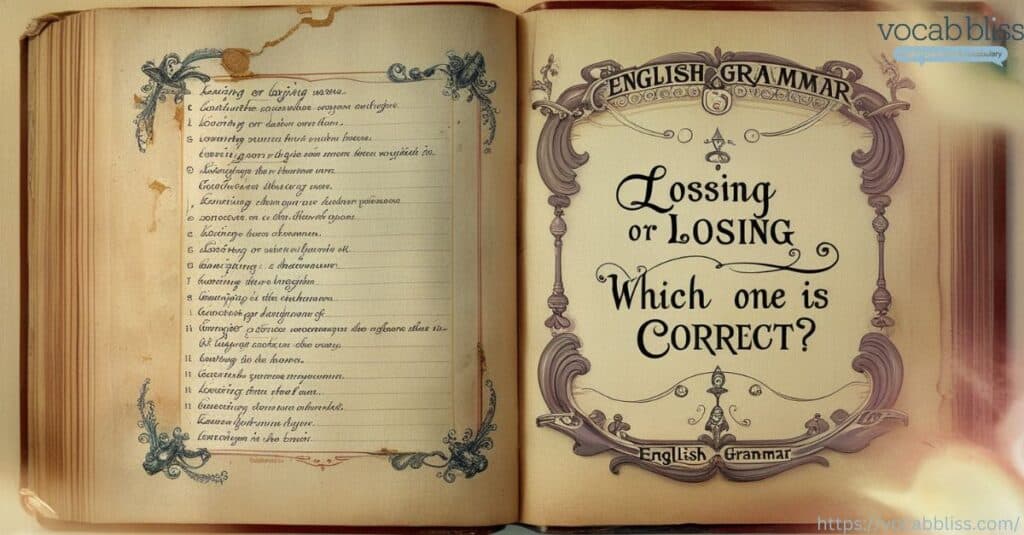Confusing “loosing or losing” is a common pitfall in everyday language. These two terms often trip up even the most seasoned writers. While they may sound alike, their meanings diverge significantly.
This article aims to clarify the key differences between “loose vs lose” explore usage examples, and highlight common mistakes that people make in their everyday scenarios. By the end, you’ll not only know which term is correct but also how to avoid common slip-ups.
Understanding the Terms: Loosing and Losing
Before diving into the specific contexts in which these words are used, let’s define each term.
Loosing
Loosing is the present participle of the verb “loose.” It generally means to release, set free, or unfasten something. For example:
- Context: “She is loosing the knots in the rope.”
- Definition: In this case, “loosing” refers to the action of untying or releasing the rope.
Common Usage of Loosing
You might encounter “loosing” in contexts such as:
- Releasing a prisoner: “The authorities are loosing the prisoners after the trial.”
- Setting free an animal: “They are loosing the birds from their cages.”

Read More: Forrest Or Forest: Clearing Up The Spelling Confusion
Losing
On the other hand, losing refers to the act of failing to keep or maintain something, resulting in its absence. This term is more commonly used than “loosing.” For instance:
- Context: “I am losing my keys again.”
- Definition: Here, “losing” indicates misplacing or failing to find the keys.
Common Usage of Losing
You’ll find “losing” in various scenarios, including:
- Games and competitions: “Our team is losing the match.”
- Personal belongings: “I hate losing my wallet.”
Common Mistakes: Misuse of ”losing or loosing”
Despite their clear definitions, many people still make frequent errors when using “loosing” and “losing.” Understanding why this happens can help us avoid these typical blunders.
Phonetic Similarity
One reason for the confusion is the phonetic similarity of the two words. They sound alike, but their meanings differ widely. When writing quickly, it’s easy to mistakenly type “loosing” when you mean “losing.”
Spelling Patterns
The spelling also plays a role. Both words share the same root but diverge in the way they end. The extra “o” in “loosing” can easily lead to standard mix-ups.

Side-by-Side Comparison
To clarify the distinctions further, here’s a side-by-side comparison of is it loosing or losing in a table format:
| Term | Meaning | Example Sentence |
|---|---|---|
| Loosing | Releasing or unfastening | “He is loosing the hound from its leash.” |
| Losing | Failing to keep or maintain | “I am losing track of time.” |
Key Differences
- Meaning: “Loosing” pertains to freeing or unfastening, while “losing” relates to failing to retain something.
- Context: “Loosing” often appears in more specific contexts, such as releasing or untying. “Losing” is used in broader contexts, including misplacing and failing.
Lose vs Loose: Understanding the Difference
Navigating the tricky waters of “lose” and “loose” can feel like walking a linguistic tightrope! While they sound similar, these words represent entirely different concepts.
“Lose” refers to the act of failing to keep something—like when you misplace your keys or lose a game. On the other hand, “loose” describes something that isn’t tightly fixed or securely held, like a loose tooth or baggy pants.
Here’s a table that highlights the differences between “lose” and “loose,” summarizing their meanings, usage examples, and contexts to provide clarity for readers:
| Term | Meaning | Example Sentence | Context |
|---|---|---|---|
| Lose | To fail to keep or maintain something | “I always lose my sunglasses at the beach.” | Misplacing or forfeiting |
| Loose | Not tight or firmly held | “Her shirt is too loose; she needs a smaller size.” | Describing a state or quality |
| Lose | To suffer a defeat in a game or competition | “Our team is going to lose if we don’t play better.” | Competitive scenarios |
| Loose | Free or released from attachment | “They are going to loose the birds from their cages.” | Releasing or setting free |
| Lose | To miss an opportunity | “Don’t lose the chance to apply for that scholarship.” | Opportunities and chances |
| Looses | Not confined or restrained | “The dog was running loose in the park.” | Describing freedom or lack of control |
This table provides a clear and concise comparison that can help readers easily distinguish between “lose vs loose” in various contexts.
You Might Also Like: Chosing or Choosing? Get It Right Every Time
Everyday Usage Examples
To further illustrate the differences, let’s explore some usage examples in everyday scenarios.
Loosing in Everyday Language
- Releasing: “The dog owner is loosing the leash to let the dog run free.”
- Unfastening: “She is loosing her hair from the braid.”
- Setting Free: “The environmentalists are loosing the captured animals back into the wild.”
Losing in Everyday Language
- Failing: “I’m losing my patience with the long wait.”
- Misplacing: “She’s constantly losing her glasses.”
- Dropping: “He was losing focus during the lecture.”

Table of Everyday Scenarios
Here’s a table summarizing the usage of “loosing” and “losing” in various everyday scenarios:
| Scenario | Loosing Example | Losing Example |
|---|---|---|
| Pets | “They are loosing the cat into the garden.” | “I’m losing my dog at the park.” |
| Games | “He is loosing the grip on the ball.” | “We are losing the game by three points.” |
| Personal Items | “She is loosing the zipper on her backpack.” | “I keep losing my keys every morning.” |
Tips for Remembering the Difference
Remembering which word to use can be tricky. Here are some tips to help you differentiate between loosing and losing:
- Mnemonic Device: Think of “loose” as having an extra “o” for releasing or unfastening. “Loosing” has an “o” for open.
- Visual Cues: Visualize a loose rope being set free when you think of “loosing.”
- Practice: Use each term in sentences. For example, write down three sentences using “losing” and three using “loosing.”
Insight the Lose and Loose Difference
Ever stumbled over the words “lose” and “loose”? You’re not alone! These two terms are often confused due to their similar spelling and sound. But knowing the difference between lose and loose is crucial. While “lose” means to misplace something or experience defeat, “loose” is all about freeing or unfastening. Think of it like this: if your shoelaces are “loose,” they need tightening; if you “lose” your shoes, they’re gone! Let’s look at some examples to make it even clearer:
| Word | Meaning | Example Sentence |
|---|---|---|
| Lose | To misplace or fail to keep something | “I always lose my keys in the morning.” |
| Lose | To be defeated or fail in competition | “They might lose the game if they don’t play well.” |
| Loose | Not tight; unfastened or free | “These jeans are too loose around the waist.” |
| Loose | To release or set something free | “They decided to loose the birds back into nature.” |
With these examples, you’ll never mix up lose and loose again in everyday language!

Conclusion
In summary, while loosing and losing may sound alike, they have different meanings and are used in specific contexts. Understanding these distinctions not only enhances your vocabulary but also improves your overall writing skills. Next time you find yourself unsure about which term to use, refer back to this guide.
Additional Resources
For further reading and practice, consider checking out the following resources:
- Grammar Guides: Websites like Grammarly offer comprehensive explanations and examples.
- Online Dictionaries: Merriam-Webster can provide definitions and context for word usage.
- Apps: Language apps like Duolingo can help reinforce your understanding of common terms.
By embracing the nuances of language, you can avoid common usage errors and express yourself more clearly. So the next time you want to drop the confusion around “loosing” and “losing,” remember this guide and apply what you’ve learned in your casual communication. You’re well on your way to mastering these commonly misused terms!







